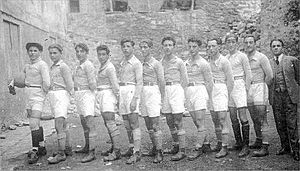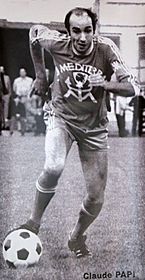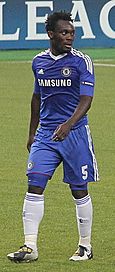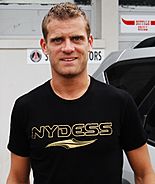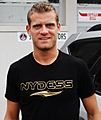SC Bastia facts for kids
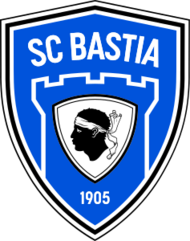 |
|||
| Full name | Sporting Club Bastiais | ||
|---|---|---|---|
| Nickname(s) | I Turchini (The Blues), I Lioni di Furiani (The Lions of Furiani), Le Sporting (The Sporting), Les Bleus (The Blues) |
||
| Short name | SCB | ||
| Founded | 1905 | ||
| Ground | Stade Armand-Cesari | ||
| Capacity | 16,048 | ||
| President | Claude Ferrandi | ||
| Manager | Benoît Tavenot | ||
| League | Ligue 2 | ||
| 2021–22 | Ligue 2, 12th of 20 | ||
|
|
|||
Sporting Club Bastia (also known as SC Bastia or just Bastia) is a professional football club from Bastia, a city on the island of Corsica, France. The team plays in Ligue 2, which is the second-highest football league in France. They won the 2020–21 Championnat National to get promoted to Ligue 2.
Bastia plays its home games at the Stade Armand Cesari in Bastia. The club is well-known for its strong connection to Corsican nationalism, which is a movement supporting Corsican identity.
Some of Bastia's biggest achievements include reaching the final of the 1977–78 UEFA Cup in 1978. They lost to the Dutch team PSV Eindhoven. At home in France, Bastia won the second division in 1968 and 2012. They also won the Coupe de France (French Cup) in 1981. When the club was first starting, they won the "Corsican League" 17 times!
Bastia has a big rivalry with AC Ajaccio, another team from Corsica. Their matches are called the Derby Corse. Many famous players have played for Bastia, like Dragan Džajić, Claude Papi, Johnny Rep, Roger Milla, Michael Essien, Alex Song, and Florian Thauvin.
In 2017, the club faced financial problems and was moved down to a lower league, the Championnat National 3. They also lost their professional status. However, I Turchini (The Blues), as they are nicknamed, worked hard and regained their professional status in 2021 when they were promoted back to Ligue 2.
Contents
- Club History
- How Bastia Started and Became Professional
- UEFA Cup Final in 1978 and French Cup Win in 1981
- Moving Down and the Furiani Stadium Event
- Back in the Top League and European Competitions
- The Fall and Rise of Bastia
- The Climb Back to Ligue 2
- Return to Ligue 1
- Financial Troubles and Climb Back to Professional Football
- A New Way to Run the Club
- Back to Professional Football
- Stadium
- Logos
- Colours and Badge
- Supporters
- Friendships
- Honours
- Players
- Coaching Staff
- Coaches Through the Years
- Images for kids
- See also
Club History
How Bastia Started and Became Professional
Sporting Club de Bastia was founded in 1905 by a Swiss teacher named Hans Ruesch. He taught German at a high school in Bastia. The club's first president was Emile Brandizi. The team celebrated its very first steps in Bastia's main square, Place d'Armes.
The club started playing professionally in 1965, joining Division 2. After three good seasons, they became champions of France's Second Division in 1968. This meant they moved up to the top league. Their first season in the top league was tough, but they managed to stay there. This period began what many consider the club's best decade. In 1972, Bastia reached the final of the Coupe de France for the first time, but lost to Olympique de Marseille. This earned them a spot in the European Cup Winners' Cup, where they were knocked out by Atlético Madrid.
UEFA Cup Final in 1978 and French Cup Win in 1981
In 1977, Bastia finished third in Division 1 with a powerful offense. This success meant they qualified for the UEFA Cup in the 1977–78 season.
This was a special time for the team, built around the talented player Claude Papi. The squad included many skilled players like Johnny Rep from the Netherlands, Jean-François Larios, a midfielder and French international, and Charles Orlanducci, a strong defender known as the "Lion of Vescovato".
The team beat several strong clubs, including Sporting Lisbon, Newcastle United, Torino, Carl Zeiss Jena, and Grasshoppers Zurich. They reached the final but lost to PSV Eindhoven (0–0 at home, 0–3 away). One of their most memorable wins was a 3–2 victory in Turin against Torino, who had not lost at home for two seasons.
The final itself had some bad luck. The first game, played at Furiani on April 26, 1978, was on a very wet field due to heavy rain. The referee decided to postpone the game because the World Cup in Argentina was coming up. Despite Bastia playing very well, the game ended in a 0–0 draw. The second game, on May 9, saw PSV Eindhoven score three goals, winning the cup. Many people in Bastia believed the loss was due to the team being tired from playing many league games and the poor field conditions in the first leg.
This journey to the UEFA Cup final was a huge moment for Corsican sport. It brought the whole island together, especially as the Corsican nationalist movement was growing.
Three years after that final, Bastia won its first major trophy: the Coupe de France in 1981. This was a big win for the Corsican club, as they beat St. Etienne, a team with the famous player Michel Platini. The final was played in Paris in front of over 46,000 fans, including the newly elected President of France.
Moving Down and the Furiani Stadium Event
After 18 years in the top league, the club was moved down to the second division at the end of the 1985–86 season. They stayed there for eight years. This period is remembered for a tragic event at Furiani Stadium. In the 1991–92 season, Bastia reached the semi-finals of the Coupe de France. The match was at Stade Armand Cesari, also known as "Furiani Stadium", against Olympique de Marseille. Because so many people wanted to see the game, a temporary stand with 10,000 seats was quickly built. Sadly, the upper part of this stand collapsed just minutes before the game started. This terrible accident resulted in 18 people losing their lives and 2,300 being injured.
Back in the Top League and European Competitions
The club returned to the top league for the 1994–95 season. That year, they reached the final of the League Cup. This time was marked by the work of Frédéric Antonetti, who coached the club and helped develop new talented players.
Antonetti coached the main team from 1994 to 2001. He helped bring in players like Lubomir Moravcik, Pierre-Yves André, Frédéric Née, and Anto Drobnjak. Drobnjak was the club's top scorer in his third season. In the 1995–96 season, Drobnjak was also the second-highest scorer in the league with 20 goals.
In the 1996–97 season, Bastia finished 7th in Ligue 1, which qualified them for the Intertoto Cup. The club won the Intertoto Cup and then qualified for the UEFA Cup in the 1997–98 season. Bastia beat Benfica but then lost to Steaua Bucharest. Bastia played well in the league in the following years, qualifying for the Intertoto Cup two more times, in 1998 and 2001, but they didn't make it to the UEFA Cup again.
After Antonetti left in 2001, the club didn't finish in the top ten again. They did reach the final of the Coupe de France in 2001–02. Their team at that time included Michael Essien, who later played for big clubs like Lyon and Chelsea. Another player who started at Bastia was defender Alex Song, who later played for Arsenal and Barcelona.
Between 2002 and 2005, several coaches tried to lead Bastia, but none could get the team back into the top ten. The club's league position actually dropped each year. In the middle of the 2004–05 season, the club was in danger of being moved down. Bastia brought in Christian Karembeu, a player who won the 1998 FIFA World Cup with France. However, Bastia was still moved down to Ligue 2 at the end of the season, after 11 years in Ligue 1.
The Fall and Rise of Bastia
In 2005, the club was relegated to Ligue 2. Five years later, Bastia was in serious danger of falling even further, to the Championnat National. On May 7, 2010, Bastia was officially moved down to the National league after a 0–0 draw with Tours.
On July 6, 2010, the club faced more problems. They were moved down to the Championnat de France amateur (an even lower league) because of financial issues. The club had a debt of €1.2 million, which was covered by money from local governments. However, on July 23, 2010, the French Football Federation allowed Bastia to play in the 2010–11 season after an appeal.
Despite these challenges, Bastia signed six new players. Some players left, like Florent Ghisolfi and Christophe Gaffory, and Pierre-Yves André retired.
The Climb Back to Ligue 2
Faruk Hadžibegić was fired as manager due to poor results, and Frédéric Hantz took over. On April 22, 2011, Bastia officially secured its spot in Ligue 2 after a game against Frejus-Saint Raphael. Many fans traveled to support the team. On May 7, 2011, Bastia became the National champion, winning 2–1 against Créteil. Bastia finished with a record 91 points and didn't lose a single home game all season. The stadium was filled with happy fans celebrating with their players and coach.
Return to Ligue 1
Bastia, newly promoted from the National league, welcomed new players like Jérôme Rothen, Toifilou Maoulida, and Florian Thauvin. Bastia started the season well. From early February to early April, Bastia did not lose a single match. On April 23, 2012, in a packed Armand Cesari Stadium, Bastia almost secured their place in the top league by winning against Châteauroux (2–1). On May 1, 2012, Bastia became champion of Ligue 2, 44 years after their first league title, with a victory over Metz at Armand Cesari. On May 11, 2012, Bastia won their last home game of the season 2–1 against Nantes. The club also had an amazing two-year streak of being undefeated at home.
Bastia won all the major awards for Ligue 2 that year: Jérôme Rothen was named best player, Macedo Novaes best goalkeeper, and Frédéric Hantz best coach. Five Bastia players were chosen for the league's best team.
In the 2016–17 Ligue 1 season, after four seasons in the top division, Bastia finished last in Ligue 1 and was moved down to Ligue 2.
Financial Troubles and Climb Back to Professional Football
On June 22, 2017, Bastia was moved down again to Championnat National because of financial issues. An audit of their finances showed they couldn't guarantee they had enough money to play in Ligue 2. In August 2017, the club's professional section was closed due to bankruptcy.
Local business owners Claude Ferrandi and Pierre-Noël Luiggi took over the club. Bastia restarted with its reserve team in Championnat National 3. After a tough first season, the club began a series of promotions. They moved up to the Championnat National 2 in the 2018–19 season. Then, they were promoted to the Championnat National in the 2019–20 season, as they were at the top of their group when the season ended early due to the COVID-19 pandemic. Bastia achieved their third promotion in a row by becoming champion of the 2020–21 Championnat National.
A New Way to Run the Club
In 2019, the club announced a new way of running things. They created a cooperative structure, which means that anyone who supports the club can invest and own shares in it. This structure allows different types of supporters to be involved in the club's decisions. The voting rights and board seats are divided among:
- Founders (Ferrandi and Luiggi families)
- Businesses and organizations
- Supporters
- Employees (players, staff, and office workers)
- Public groups (like regional and city authorities)
- The SC Bastia Association
This setup helps the club involve all kinds of supporters in a clear and open way.
Back to Professional Football
SC Bastia returned to professional football in the 2021–22 Ligue 2 season, for the first time since their bankruptcy in 2017. They had a difficult start, and manager Mathieu Chabert was replaced by Régis Brouard in October 2021. The club finished comfortably in 12th place.
The next season, the club had a mixed first half but a very strong second half. Régis Brouard led the team to a 4th place finish, even looking like they might get promoted for a while. Fans had high hopes for the next season. However, the club had a tough first half of the season, being 15th at the halfway point. Régis Brouard was again replaced in January 2024. Reserve team coach Michel Moretti and assistant coach Lilian Laslandes took over as temporary coaches, guiding the team to a 13th place finish.
On March 26, 2024, the club announced that Frédéric Antonetti would return as Technical Director. He is now in charge of the sporting plans for the main team, as well as the youth and reserve teams. Benoît Tavenot was then named the first team coach on June 5, 2024, also returning to SC Bastia for the 2024–25 Ligue 2 season.
Stadium
The Stade Armand Cesari, also known as Stade Furiani, is the main football stadium in Corsica. It is located in Furiani and is used by SC Bastia. In 1992, the stadium hosted the semi-finals of the Coupe de France. During this match, a temporary grandstand collapsed, leading to a tragic event.
The stadium was old and not very safe, with barbed wire around the field and worn-out stands. It hosted the 1978 UEFA Cup Final. At that time, the stadium could hold less than 12,000 people. Heavy rain had fallen on Corsica that day, making the field very muddy, which affected the important match. The record attendance at the stadium was on September 1, 2012, when 15,505 people watched Bastia lose to St. Etienne (0–3) in a league game. The second highest attendance was in 1978, when 15,000 people saw Bastia draw against PSV Eindhoven (0–0) in the UEFA Cup final.
Logos
Colours and Badge
For the 2011–12 season, the club decided to change its logo. Here's why:
- They replaced "SCB" with "Bastia" to show it's the city's club.
- The new shield has a moor's head, which comes from the Testa Mora Flag, a historic symbol of Corsica. This also brings back the look of the 1978 jersey.
- The main color is blue, with white edges and black, which have been the club's official colours since 1992.
Supporters
Bastia has many supporters among Corsicans. Their fans often show symbols of Corsican nationalism, like using the local language and symbols, and supporting the island's independence. The fans are called Turchini, which means "Blues" in Corsican.
Bastia fans have rivalries with most teams from mainland France. Their biggest rivals are Nice, and their matches are called the Derby de la Mediterranée. This derby can also refer to rivalries with Marseille and Monaco. They also have a rivalry with the Paris club PSG due to political differences between the capital city and Corsica.
Another major rivalry is the Corsican derby with other island teams like AC Ajaccio and Gazélec Ajaccio. These matches are about which team is the best on the island.
Friendships
Since 2004, the Bastia fan groups have had a friendly relationship with the Nuova Guardia, a historic fan group of Torres from Italy.
Honours
Domestic Trophies
- Ligue 2
- Winners: 1967–68, 2011–12
- Championnat National
- Winners: 2010–11, 2020–21
- Coupe de France
- Winners: 1980–81
- Runners-up (finalists): 1971–72, 2001–02
- Coupe de la Ligue
- Runners-up (finalists): 1994–95, 2014–15
- Trophée des champions
- Winners: 1972
- Corsica Championship
- Winners (17): 1922, 1927, 1928, 1929, 1930, 1931, 1932, 1935, 1936, 1942, 1943, 1946, 1947, 1949, 1959, 1962, 1963
Continental Trophies
- UEFA Cup
- Runners-up (finalists): 1977–78
- Intertoto Cup
- Champions: 1997
Players
Current Squad
|
|
Players Out on Loan
|
|
Reserve Squad
Most Appearances for Bastia
| Rank | Name | Total Matches | Matches in Top League |
|---|---|---|---|
| 1. | Charles Orlanducci | 507 | 410 |
| 2. | Claude Papi | 479 | 382 |
| 3. | Paul Marchioni | 332 | 227 |
| 4. | Pierre-Yves André | 330 | 134 |
| 5. | Jean-Louis Cazes | 329 | 276 |
| 6. | Yannick Cahuzac | 324 | 121 |
| 7. | Morlaye Soumah | 276 | 211 |
| 8. | Georges Franceschetti | 276 | 236 |
| 9. | Simei Ihily | 255 | 219 |
| 10. | André Burkhard | 250 | 217 |
Last updated: March 7, 2017.
Top Scorers for Bastia
| Rank | Name | Total Goals | Goals in Top League |
|---|---|---|---|
| 1. | Claude Papi | 134 | 110 |
| 2. | Pierre-Yves André | 102 | 84 |
| 3. | François Félix | 78 | 63 |
| 4. | Marc-Kanyan Case | 59 | 53 |
| 5. | Jacques Zimako | 57 | 53 |
| 6. | Anto Drobnjak | 56 | 50 |
| 7. | Frédéric Née | 54 | 45 |
| 8. | Louis Marcialis | 48 | 39 |
| 9. | Jean-Pierre Serra | 45 | 37 |
| 10. | Thierry Meyer | 40 | 17 |
French International Players
| Rank | Name | Total Caps | Years Played |
|---|---|---|---|
| 1. | Claude Papi | 3 | 1973–1978 |
| 2. | Jacques Zimako | 2 | 1977 |
| = | Charles Orlanducci | 1 | 1975 |
| = | Pierrick Hiard | 1 | 1981 |
| = | Frédéric Née | 1 | 2001 |
Coaching Staff
Coaches Through the Years

 Boumedienne Abderrhamane (1957 – 1961)
Boumedienne Abderrhamane (1957 – 1961) François Fassone (1961 – 1963)
François Fassone (1961 – 1963) Gyula Nagy (1963 – 1964)
Gyula Nagy (1963 – 1964) André Strappe (1964 – 1965)
André Strappe (1964 – 1965) Gyula Nagy (1965 – 1966)
Gyula Nagy (1965 – 1966) Lucien Jasseron (1966 – 1969)
Lucien Jasseron (1966 – 1969) Rachid Mekhloufi (1969)
Rachid Mekhloufi (1969) Edmond Delfour and
Edmond Delfour and  Rachid Mekhloufi (1969 – 1970)
Rachid Mekhloufi (1969 – 1970) Edmond Delfour (1970)
Edmond Delfour (1970) Gyula Nagy (1970 – 1971)
Gyula Nagy (1970 – 1971) Jean Vincent (February 28, 1971 – October 31, 1971)
Jean Vincent (February 28, 1971 – October 31, 1971) Pierre Cahuzac (November 1, 1971 – 1979)
Pierre Cahuzac (November 1, 1971 – 1979) Jean-Pierre Destrumelle (1979 – 1980)
Jean-Pierre Destrumelle (1979 – 1980) Antoine Redin (1980 – 1985)
Antoine Redin (1980 – 1985) Alain Moizan (August 31, 1985 – November 30, 1985)
Alain Moizan (August 31, 1985 – November 30, 1985) Antoine Redin (December 1, 1985 – 1986)
Antoine Redin (December 1, 1985 – 1986) Roland Gransart (1986 – 1991)
Roland Gransart (1986 – 1991) René Exbrayat (1991 – 1992)
René Exbrayat (1991 – 1992) Léonce Lavagne (1992 – 1994)
Léonce Lavagne (1992 – 1994)
 Frédéric Antonetti (October 2, 1994 – 1998)
Frédéric Antonetti (October 2, 1994 – 1998) Henryk Kasperczak (1998 – October 18, 1998)
Henryk Kasperczak (1998 – October 18, 1998) Laurent Fournier (October 19, 1998 – April 15, 1999)
Laurent Fournier (October 19, 1998 – April 15, 1999)
 José Pasqualetti (April 15, 1999 – June 30, 1999)
José Pasqualetti (April 15, 1999 – June 30, 1999)
 Frédéric Antonetti (July 1, 1999 – June 30, 2001)
Frédéric Antonetti (July 1, 1999 – June 30, 2001) Robert Nouzaret (July 1, 2001 – June 30, 2002)
Robert Nouzaret (July 1, 2001 – June 30, 2002) Gérard Gili (July 1, 2002 – June 30, 2004)
Gérard Gili (July 1, 2002 – June 30, 2004)
 François Ciccolini (July 1, 2004 – April 15, 2005)
François Ciccolini (July 1, 2004 – April 15, 2005) Éric Durand and
Éric Durand and 
 Michel Padovani (April 15, 2005 – June 30, 2005)
Michel Padovani (April 15, 2005 – June 30, 2005) Bernard Casoni (July 1, 2005 – June 30, 2009)
Bernard Casoni (July 1, 2005 – June 30, 2009) Philippe Anziani (July 1, 2009 – November 25, 2009)
Philippe Anziani (July 1, 2009 – November 25, 2009)
 Michel Padovani (November 25, 2009 – December 8, 2009)
Michel Padovani (November 25, 2009 – December 8, 2009) Faruk Hadžibegić (December 8, 2009 – June 30, 2010)
Faruk Hadžibegić (December 8, 2009 – June 30, 2010) Frédéric Hantz (July 1, 2010 – May 17, 2014)
Frédéric Hantz (July 1, 2010 – May 17, 2014) Claude Makélélé (May 24, 2014 – November 3, 2014)
Claude Makélélé (May 24, 2014 – November 3, 2014) Ghislain Printant (November 3, 2014 – January 28, 2016)
Ghislain Printant (November 3, 2014 – January 28, 2016)
 François Ciccolini (January 28, 2016 – February 27, 2017)
François Ciccolini (January 28, 2016 – February 27, 2017) Rui Almeida (February 27, 2017 – June 26, 2017)
Rui Almeida (February 27, 2017 – June 26, 2017) Réginald Ray (June 26, 2017 – August 17, 2017)
Réginald Ray (June 26, 2017 – August 17, 2017)
 Stéphane Rossi (August 17, 2017 – October 23, 2019)
Stéphane Rossi (August 17, 2017 – October 23, 2019) Frédéric Née (interim) (October 24, 2019 – October 28, 2019)
Frédéric Née (interim) (October 24, 2019 – October 28, 2019) Mathieu Chabert (October 28, 2019 – September 22, 2021)
Mathieu Chabert (October 28, 2019 – September 22, 2021) Cyril Jeunechamp and
Cyril Jeunechamp and  Frédéric Zago (interim) (September 22 – October 2, 2021)
Frédéric Zago (interim) (September 22 – October 2, 2021) Régis Brouard (October 2, 2021 - January 29, 2024)
Régis Brouard (October 2, 2021 - January 29, 2024)
 Michel Moretti and
Michel Moretti and  Lilian Laslandes (January 29, 2024 - June 5, 2024)
Lilian Laslandes (January 29, 2024 - June 5, 2024)
 Benoit Tavenot (June 5, 2024 - Present)
Benoit Tavenot (June 5, 2024 - Present)
Images for kids
See also
 In Spanish: Sporting Club Bastiais para niños
In Spanish: Sporting Club Bastiais para niños
 | Selma Burke |
 | Pauline Powell Burns |
 | Frederick J. Brown |
 | Robert Blackburn |


